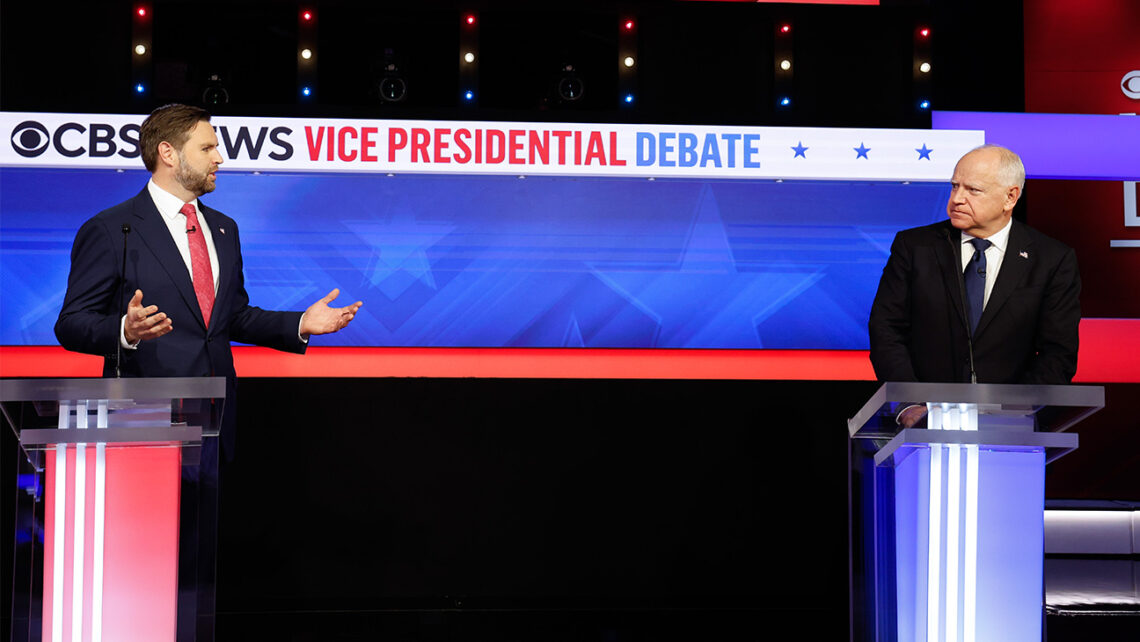Immigration policies ignite fiery debate between Vance and Walz
A clash of perspectives on border control
In a heated debate on CBS, GOP vice presidential candidate JD Vance and Minnesota Governor Tim Walz sparred over immigration policies, with a particular focus on the impact of former President Donald Trump and Vice President Kamala Harris. The discussion highlighted the contrasting approaches to border control and immigration reform, reflecting the deep divisions within American politics.
Vance’s critique of Harris and the Biden administration
During the debate, Vance was questioned about the potential reimplementation of the controversial family separation policy, which was a hallmark of the Trump administration. Instead of directly addressing the question, Vance shifted the blame to Harris, accusing her of exacerbating the immigration crisis through her policies.
“We have a historic immigration crisis because Kamala Harris started and said that she wanted to undo all of Donald Trump’s order policies — 94 executive orders, suspending deportations, decriminalizing illegal aliens, massively increasing the asylum fraud that exists in our system that has opened the floodgates, and what it’s meant is that a lot of fentanyl is coming into our country,” Vance asserted.
Harris’ role in addressing root causes of migration
President Joe Biden tasked Vice President Harris with leading diplomatic efforts to address the root causes of migration from Mexico, Guatemala, El Salvador, and Honduras. Despite this, Republicans have labeled her the “border czar,” a title that has resurfaced in the current election cycle.
Walz defends Harris’ record and highlights bipartisan solutions
Governor Walz, who has enacted legislation in Minnesota to support undocumented immigrants, defended Harris’ record as California’s attorney general. He emphasized her efforts in prosecuting transnational gangs involved in human trafficking and drug interventions.
“Kamala Harris was the attorney general of the largest state, a border state, in California. She’s the only person in this race who prosecuted transnational gangs for human trafficking and drug interventions. But look, we all want to solve that. Most of us want to solve this — and that is the United States Congress; that’s the Border Patrol agents; that’s the Chamber of Commerce; that’s most Americans out here. That’s why we had the fairest and the toughest bill on immigration that this nation has ever seen,” Walz stated.
Walz also reminded the audience that Trump had opposed a comprehensive immigration reform bill during his presidency, suggesting that the issue was being used as a polarizing election tactic.
Avoiding direct answers and shifting blame
Both candidates dodged direct answers during the debate. Vance did not provide a clear response to the question about family separation, while Walz avoided addressing the topic of mass deportations. This evasion reflects the complexity and sensitivity of immigration issues in the current political climate.
When pressed again by moderator Margaret Brennan, Vance reiterated his criticism of Harris without committing to a specific policy stance on child separation.
“My point is that we already have massive child separations thanks to an open border. I didn’t accuse Kamala Harris of inviting drug mules. I said that she enabled the Mexico to operate freely in this country, and we know that they use children as drug mules, and it is a disgrace, and it has to stop,” Vance said.
The Springfield controversy and its implications
Walz managed to pivot the debate to a recent controversy involving allegations of immigrants eating pets in Springfield, Ohio. This story, which was amplified by Trump and Vance, has been debunked but continues to capture public attention.
“We could come together and solve this if we didn’t let Donald Trump continue to make it an issue,” Walz argued. “And the consequences in Springfield were the governor had to send state law enforcement to escort kindergartners to school by standing with Donald Trump and not working together to find a solution…when it becomes a talking point like this, we dehumanize and villainize other human beings.”
Reflecting on the broader implications
The debate between Vance and Walz underscores the ongoing challenges and complexities of immigration policy in the United States. As the nation grapples with these issues, the need for informed, compassionate, and effective solutions becomes increasingly apparent.
Did you enjoy this article? Share it on your social channels and let us know your thoughts! Don’t miss out on the latest updates! Follow us on social media to stay informed about the newest releases.

 Italian
Italian







